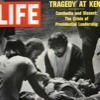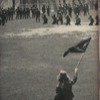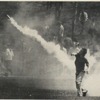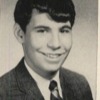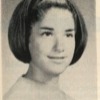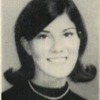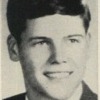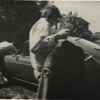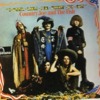

If you see this message, that means that you either do not have the latest version of Adobe Flashplayer installed (install it here) or you have blocked the ActiveX control for Internet Explorer. Please reload the page and allow the control.
 |
 |
 |
| Ms. Birker: 1960's | ||
| Ms. Birkner remembers when the National Guard opened fire at Kent State. |
Cheryl Birkner grew up in Kent, Ohio and attended Kent State. She was familiar with the area and witnessed how people from the town and college changed and reacted to the Vietnam War. She was aware of her surroundings and of the anti-war movement elevating on campus. The anti-war movement that was building all over the country touched Ms. Birkner first hand. Ms. Birkner was a freshman in college when the Kent State protest occurred. She was on campus at the time and heard the shootings. The whole experience affected her emotions and the emotions on the campus. Ms. Birkner also experienced the strong hatred towards hippies that was increasing in this working class town. She recalls a time when she and many people of her town were looked upon negatively. Her experiences are crucial to the understanding of anti-war movement in Kent and all over the country.
Ms. Birkner was at the prime age when the Vietnam War was beginning to be looked upon negatively. She was aware of the events from this time and was able to share her views of the issue. Ms. Birkner has important recollections from this time that will help the younger generation today grasp how the anti-war movement impacted the country.
Q: Please state your name.
Ms. Birkner: Cheryl Birkner.
Q: When were you born?
Ms. Birkner: 1951
Q: As a teenager how aware were you of world events?
Ms. Birkner: I think I was very aware. There was a lot of politics going on in the world. The Vietnam War was going on when I was a teenager, so there were a lot of teenage boys eligible for the draft.
Q: When did you first hear about the conflict in Vietnam? Did you worry about how it might impact your future? Why or why not?
Ms. Birkner: Well, I heard about it in high school, and you know I cant remember exactly when and I didn’t think it would impact my specific future, but I knew a lot of young men who were eligible for the draft, and some wanted to join the military forces, but some didn’t. I had several cousins who did join the army or marines; four cousins who were in the military at some point during that time, and I worried very much about them.
Q: What was your general opinion about the war in Vietnam?
Ms. Birkner: Well, I came to oppose it because I just did not think that we were going to do anything very good for the country or the people. I got some of that from people who had been veterans that had come back and I had talked to them.
Q: Why were you at the protest? Were the people at the protest mainly college students or people from the community?
Ms. Birkner: Well, most of the people that were there that day were not protesters. I was not there as a protester. When I looked around it was a class day, and it was between classes, and classes were just let out. It was a very large area in the middle of campus. If you were going from one point of the campus to another you usually walked through there. When I looked around, and when I came to that area, I saw a lot of soldiers. I saw some people standing on the hill next to them, and they were shouting, and that was the protest. I
looked all around me, and there were mostly students because they were mostly on campus. I saw professors. I saw janitors. A lot of noise was going on and shouting and there were bullhorns and loud speakers that the soldiers had, so there was lots of noise. It was right before lunch, between classes at lunchtime, and it was a beautiful day. Hundreds of people were out on campus. There was a huge area in the middle of campus. All I really noticed were those students and teachers and people who worked for the university.Q: Were you an undergraduate there?
Ms. Birkner: I was a freshman.
Q: Do you know how the protest was planned? And how did you find out? And were you involved in it?
Ms. Birkner: No, I wasn’t involved. I wish I did so I could tell you, but I really don’t know how it was planned. I don’t even know if it was planned. I know that a lot of activities had happened that weekend, and there were signs posted all over campus. That was the first I knew of any possible thing. There were signs posted on campus from the administration saying no one could gather in groups of more than three, which is really hard when you have hundreds of people on campus. Everyone was moving around. So that was the first I knew
about it until I started to walk between classes. I was going to get lunch on the way, and no, I wasn’t a protester.Q: Did you see the National Guard with their guns at all?
Ms. Birkner: Yes, oh they were there sort of in the middle of the field, and they had guns, they weren’t pointing them at that time. They were just standing there, and with their bullhorns they were saying that everyone needed to disperse.
Q: How did the students react to the National Guard?
Ms. Birkner: Well, one group of students that were on the hill were shouting anti-war slogans. Most people were just milling around, and I think actually the reaction I felt all around me of the students and faculty especially, was kind of angry that the National Guard was there right in the middle of campus.
Q: After this protest at Kent State were people up to more protests or was this it?
Ms. Birkner: Oh, there were enormous protests all over the country after the students were killed. At Kent State itself, everyone was so shocked and in mourning, and they closed the school, and there really wasn’t much going on. Most students just left. I think there were some groups who tried to get some protests going on there, but it really didn’t work. There were different protests in Berkley and in at many different colleges over the country. Then I can’t quite remember how long it took, and then many of the students who had been there (Kent State) went on speaking tours about what had happened to other
Campuses.Q: What actually went though your mind when the National Guard opened fire?
Ms. Birkner: They had been marched all over the place. They turned around at some point, and one line of soldiers got down on their knees, and pointed their guns straight ahead. The soldiers behind them also pointed their guns. They looked like they were in formation. To tell you the truth you don’t think at a moment like that. I just started walking and running at the other direction. It was terrifying that they were pointing their guns, and I just walked away. They
were pretty far away, but I started walking in the other direction. First there was one shot all by itself, and I just dived on the ground. It was like an automatic response. Then somebody else landed on top of me, and then I heard more shots. Then I heard him say that he was protecting me. I didn’t even know him. There were students all over the place. I heard him say oh those will be blanks. He was a veteran.Q: Did the protesters disperse fairly quickly after the shots or did people continue to protest?
Ms. Birkner: The protesters scattered far away into the parking lot to get away from the soldiers. Mostly it was students and faculty and everybody that was there was in shock. Some people actually did go over the hill and sit down, and say they refused to move. A very brave teacher a good friend of mine (and his son was a good friend), he finally got those students to move. They said we’re just going to sit there in solitary with the students who were killed. They wouldn’t move. The soldiers said they would make them move, or shoot, and so he finally got them to move and got the soldiers to stop pointing their guns. There was really nothing else after that.
Q: Did your opinions about the government and their actions in the war change after this protest?
Ms. Birkner: Yes, I was just very shocked that that kind of thing could happen. I talked with my cousin who was an army intelligence actually afterwards, and he said the army would never hand out live ammunition to load into those kind of rifles in a civilian situation. He didn’t believe that they could have done something like that. I know that several friends of mine that lived in town that couldn’t leave were arrested while watching TV in their apartments for curfew violations. My opinion right then of the government was pretty negative. I was
very paranoid because they were arrested for being outside while they were inside, and it turned out that somebody thought that radical organizers were living in them. They had the wrong addresses and things like that. They hauled people off to jail.Q: Did the protest seemed controlled?
Ms. Birkner: I don’t know because I didn’t see it start or anything. It seemed more like a lot of people were shouting the same slogans like when you see a protest march or something, but people were shouting things together so in that way it seemed controlled. It certainty might have been organized, but I don’t know. I didn’t see anything that told me that. I would not doubt that there were organizers.
Q: What was it like in the town of Kent after the shootings?
Ms. Birkner: It was very quiet. Right afterwards I lived off campus, and so I went home. I was walking home; I always walked. I was carrying my books. I had been carrying my books the whole time, my class books, and I was walking home and all of the sudden there was a troop carrier, sort of like a [humv] driving next to me, and they had their guns pointing out the window at me. I was walking
all by myself to my house where I rented a room, and I couldn’t have looked very intimidating because I was 19 years old, I was wearing a little skirt and vest that I had made in high school home economics class, and carrying my books. I don’t think I looked very scary or much like a protester, but they were doing that. They were scared too I think [the soldiers]; they didn’t know what to believe. They were driving all over the place watching students; anyone who looked young. They went all the way home with me pointing their guns at me.Q: Did they say anything to you or did you say anything to them? Were there any interactions?
Ms. Birkner: No, I was just scared. I don’t remember if I said anything at all. I don’t think they said anything to me.
Q: So they just followed you home?
Ms. Birkner: They were right beside me.
Q: With their rifles?
Ms. Birkner: Yes, they were very paranoid and scared. Later on we heard a recording of the governor of the state. They had been up for a couple of days with very little sleep, at a teamster riot where there was violence. There was shooting going on, and they took some of that right to the campus, and there was a recording of the governor telling the National Guard that the students at Kent State were armed and dangerous. They believed that; they were young men too.
They were very young and scared too, and thought people were armed and were going to shoot.Q: Were you at all scared when the protesters started throwing rocks?
Ms. Birkner: I never saw any rocks thrown. I was scared when the first thing I saw thrown was tear gas.
Q: Were you affected by that [tear gas]?
Ms. Birkner: No, I was way off in the distance, and they threw the tear gas at the protesters who were shouting, and then I saw one young man who was in the protest run up with a handkerchief on his noise, pick it up and throw it back at them. To tell you the truth, at that point it was a beautiful sunny day right around lunchtime; a lot of people started laughing. They thought oh they’re going to throw tear gas back and forth. People thought that it was kind of funny, and then the National Guard starting marching towards the protest. They went over the hill, and marched. I must say just about everyone around there was thinking “oh this is a big show,” and hundreds of other people went over the hill to see what was going to happen next. The protesters were sort of dashing off in one direction, and tear gas being thrown back and forth. I saw one guy pick up a piece of wood, a little piece of wood, it was a pretty woody campus there, and he basically threw it up in the air, but that’s all I saw thrown. I never saw any rocks.
Q: How long was the guard at Kent State?
Ms. Birkner: You know I’m not sure; I guess they came over the weekend. They were probably there for a couple of days over the weekend. They came and were there on Monday when that happened, and then they stayed around in town for a couple more days. I’m not really sure. I was scared, and school was cancelled, and I stayed inside.
Q: When you read the news about this happening did you feel they were accurate? What were your initial reactions to the news?
Ms. Birkner: The initial reactions and things that happened were very strange news. There were reports of which many were proven false later; there were strange connections of the students that were killed; that ten people were killed; so, there were inaccurate reports about how many kids were killed and hurt. There were reports that the National Guard had been shot. There were reports that one of the girls that had been killed was pregnant, and she wasn’t. All sorts of
strange things happened. It took a long time before the stories got straightened out. Everyone was very paranoid about everything. Even before then I remember walking down to the fast food place wearing a really nice silk Indian shirt from India and a pair of jeans and sandals, and you wouldn’t think that sounds very weird; back then I remember I looked like a teenager. A Mother pulled her children away from me saying don’t go near that dirty hippie. There were some nasty feelings.Q: Was this around the campus or somewhere else?
Ms. Birkner: Near campus. I guess anybody who had anything a little ethic on was
considered a hippie.Q: Was there a lot of division like that in the town of Kent?
Ms. Birkner: There was actually, yes. There was a lot of fear of students. I must admit students probably seemed pretty weird to a lot of people who lived in town. It was not a time when it was easy to have what is considered normal today long hair, or jeans with patches on them; those made you pretty weird.
Q: Were most people around Kent State mostly anti-war after this whole thing?
Ms. Birkner: Well you know the whole country was moving that direction. Most students were, and professors. You can understand a lot of young men, like I said I had four cousins who joined the armed forces. Certainly one came back very anti-war because that was the way he felt about what they had done there, and the others not. There was a big division. People had all sorts of different opinions, but most people on campus were anti-war, and I think the town was divided although probably leaning towards pro-war. I’m just guessing, maybe the majority felt that way. Even in my own family there were different opinions.
Q: How did you feel going back to the college after all this?
Ms. Birkner: The next year it felt very strange. Everyone seemed so much more sober. Everyone just didn’t think that this all could have happened. Kent State became a very sleepy Midwestern university, and people were feeling fairly angry that the war was continuing. It was then that you saw young men coming back from the war living on the streets; you started to see those ruined people. I was glad to get back to school after it had been cancelled for so long.
Q: How long was school cancelled for?
Ms. Birkner: Well this was all May 4th so it was cancelled for that semester, and I cant remember if they started up in the summer or not. There might have been a few classes in the summer, but we were on the quarter system, so they cancelled for the quarter, all of May and part of June, it was shut down.
Q: Did you have a lot of friends that went off to Vietnam?
Ms. Birkner: Actually very few that I knew. Although as I said out of my four cousins all of them in one capacity or another, two of them were [intelligents] so they didn’t really fight but two of them were in some very serious fighting, some of the worse battles. I had friends who protested the draft one way or another; some of them didn’t get involved.
Q: Did you see the draft affecting a lot of students your age?
Ms. Birkner: Well, what was happening was college students had deferments, and if they dropped out of school or if their grades weren’t good enough, or couldn’t stay in school, then they might have been drafted right away. You could say one reason a lot of young men were staying in school was that they did not want to be drafted right then. They weren’t necessarily anti-military; they were anti that particular war.
Q: How did you feel that the soldiers/national guard had been given live rounds?
Ms. Birkner: Well, at first I believed that young men who said he was a veteran. It wasn’t until someone started screaming and we saw someone lying there, and bleeding. No one had really believed that anyone had been shot. People saw that they had been. I didn’t know what to think, I had believed that they wouldn’t do that, and then I started to get angry thinking “I cant believe that anyone could be shooting on this beautiful sunny day out in the grass.” I Couldn’t believe) someone would have started shooting. It made no sense at all.
Q: So would you would say most of people watching this were like you at the campus, watching this occur instead of people that were actually involved in this?
Ms. Birkner: Well the amount of protesters was actually very small. This is a campus with around 25 thousand students, and it was a Monday, it was the middle of May, in the middle of campus, so you can imagine just how many people would have been out there. Most people were just like me carrying books, or backpacks or something like that.
Q: Did you know anyone who was actually shot?
Ms. Birkner: I didn’t know her very well, I knew Alison Pratt. She was killed. She was in my art history class earlier in the year, so I knew her a little bit, but not very well. Very nice person, beautiful girl. I know somebody who’s the uncle of one of the other girls that were killed, and was a long ways away. She didn’t even know the protest was going on. She was walking in between classes. I guess she did, she told someone she just wanted to stay as far away of it as possible, but the bullets carried so far, she was killed quite a long ways away.
Q: Did this make you angry about the government using national guards with guns knowing how they killed people you knew?
Ms. Birkner: Very much so. It made me very angry that this happened. I will say I don’t know what happened, I don’t know if anyone has been able to figure out what has happened when they were shot because they was nobody really near the national guard when they shot. I don’t know if anyone has ever figured out why they did it. I just know that there was one shot first, and then a bunch more.
Q: Did you see them get carried off?
Ms. Birkner: No, by then I had also been scared because it was getting very scary out there. I left. Everyone who had been hit was still lying there. I could see there were student around who were trying to take care of them, and I did see some ambulances arrive.
Q: Do you think the nation as a whole learned anything from Kent State?
Ms. Birkner: Actually I think it did. I think it shocked a lot of people that students…children were killed like this
